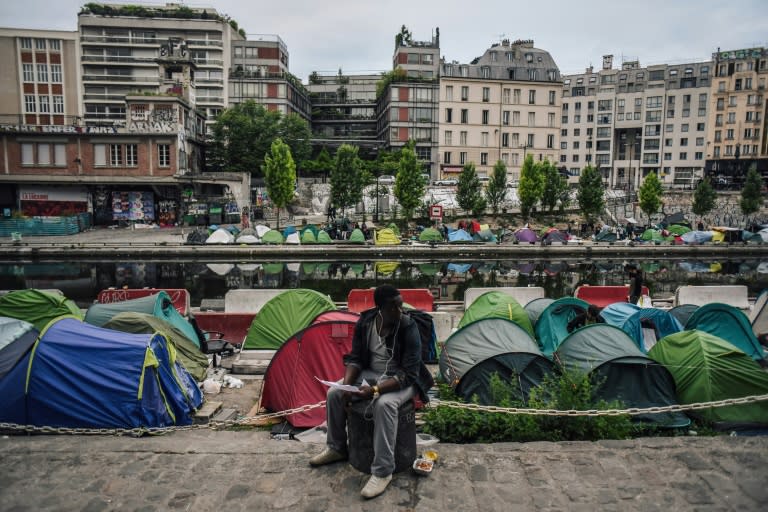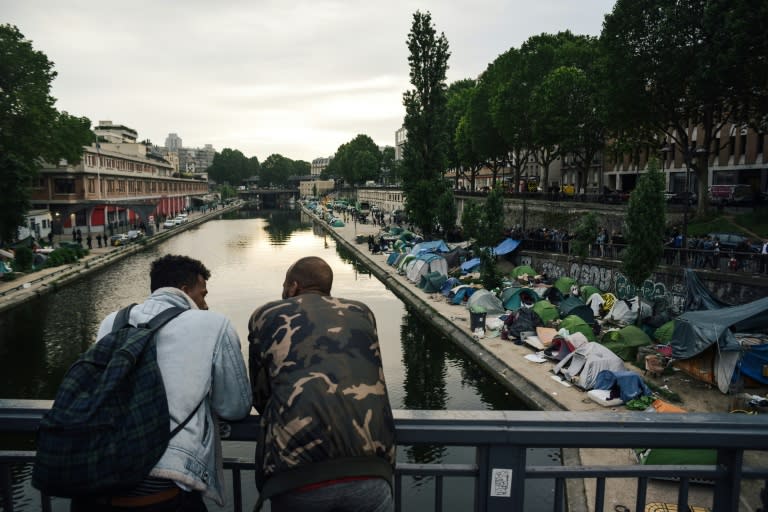Paris migrant camps: gone today, back tomorrow
Thirty-seven camps in three years and counting. French authorities are on a mission to keep Paris free of makeshift migrant shelters but endless police operations to raze them -- around one a month -- have failed to stop new camps sprouting up. Men in white protective suits fanned out along the scenic Canal Saint-Martin this week, tearing down dozens of tents where hundreds of migrants had been sleeping for months. Grubby mattresses and sleeping bags were piled into skips during Monday's operation, as tourists looked on in what is billed as one of the most romantic spots in Paris. Authorities evicted 973 migrants from that camp and another, just a few days after clearing a similar number -- mainly Sudanese, Somalians and Eritreans -- from the sprawling Millenaire camp further up the canal. "It's completely unrealistic to think these clearances are a long-term solution," said Alix Geoffroy, general manager at migrant aid group Utopia56. After eviction, "migrants spend several days (sleeping in) gymnasiums, and then, once the administrative process has begun, they leave," she said. Many slip through the net, having been tipped off about the police operations in advance. In the case of the Millenaire camp, some 600 residents had already packed up by the time security forces arrived. - The 'Dublin' problem - For many migrants, the root of the problem -- and the reason they want to stay under the radar -- is the EU's Dublin Regulation, under which they must apply for asylum in the European country where they first arrive. This has put huge pressure on Italy and Greece, the entry points for more than 1.5 million people fleeing war and poverty in the Middle East, Africa and Asia since 2015. For most of those in France, that means being deported to Italy, where they were registered and fingerprinted after the perilous Mediterranean crossing from Libya. "The fingerprints are a big problem for us," said Mohammad, a Sudanese 23-year-old who has been sleeping rough in Paris since arriving a month ago. He and his friend Ibrahim, 22, had slept on the streets in Italy and came to France because they were frustrated by their lack of progress there. Mohammed wants to learn French and get a job driving a bulldozer -- a skill he learned in Sudan's war-torn Darfur region -- but feels helpless in the situation created by the Dublin rule. NGOs describe a revolving door of migrants being sent back to Italy, turning around and slipping back into France again. "I met a migrant who had been to Italy and back five times," said Geoffroy. - 'Invisible' migrants - Out of 125,000 people with pending asylum applications, only 65,000 are sheltered by the French state, according to Gerard Sadik, who handles asylum at migrant aid group Cimade. Yannick Le Bihan, director of French operations at medical charity Medecins du Monde, said that while the operations to clear unsanitary camps were "necessary" it was up to authorities to provide migrants with a "dignified" alternative. Asylum-seekers are not the only ones affected by a lack of state-run accommodation. Some who have already been granted refugee status have also been literally left out in the cold. Of those evicted from the Millenaire camp around 10 percent had refugee status and yet "still find themselves in the street", said Pierre Henry of asylum seekers' support group France Terres d'Asile. For them, getting asylum was just "the start of another struggle, because once accepted they have only three to six months before they have to leave their (temporary) housing", he said. Sadik said this was one of the factors swelling the camps. "The state knows perfectly well that if they want to bring an end to the camps, it's up to them to create spaces in shelters," he said. "And it's not up to the city of Paris," he added, siding with Socialist Mayor Anne Hidalgo in her ongoing dispute with President Emmanuel Macron's centrist government over who is responsible for finding a solution. Hidalgo has pushed for the government to create a large new migrant shelter for Paris, though critics say this would serve as a magnet for arrivals. For now, Mohammad and Ibrahim said many migrants were laying low on the city fringes -- which, Le Bihan charged, is exactly what the state wants. "They want to make migrants invisible," he said.




